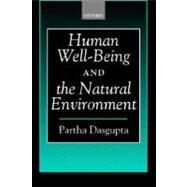Human Well-Being and the Natural Environment
, by Dasgupta, Partha- ISBN: 9780199247882 | 0199247889
- Cover: Hardcover
- Copyright: 1/10/2002
In Human Well-Being and the Natural Environment, Partha Dasgupta exploresways to measure the quality of life. Although the problem pervades a number ofacademic disciplines, it is not confined to the academic realm. Internationalorganizations regularly publish cross-country estimates of the quality of life,journalists and commentators publicize them, and national governments areobliged to take note of them. Today, quality-of-life indices broker politicalarguments and together form a coin that even helps purchase economic and socialpolicy.It is therefore ironic that indices of human well-being in current use arenotably insensitive to our dependence on the natural environment, both at amoment in time and across generations. Moreover, international discussions oneconomic development in poor regions all too frequently ignore the naturalresource base. In developing quality-of-life measures, Professor Dasgupta paysparticular attention to the natural environment, illustrating how it can beincorporated, more generally, into economic reasoning in a seamless manner. Theresult is a treatise that goes beyond quality-of-life measures and offers acomprehensive account of the newly emergent subject of ecological economics. Theconnections between biodiversity, ecosystem services, resource scarcities, andeconomic possibilities for the future are developed in a quantitative, butaccessible, language. Such familiar terms as 'sustainable development', 'socialdiscount rates', and Earth's 'carrying capacity' are given a firm theoreticalunderpinning. The theory that is developed is then put to use in extendedcommentaries on the economics of population, poverty traps, global warming,structural adjustment programmes, and free trade. The author shows that, whetherwe are interested in valuing the state of affairs in a country or in evaluatingeconomic policy there, the index that should be used is the economy's wealth,which is the social worth of its capital assets. The concept of wealth adoptedhere is a comprehensive one, including not only manufactured assets, but alsohuman capital, knowledge, and the natural environment. Wealth is contrasted withsuch popular measures of human well-being as gross national product and theUnited Nations Development Programme's Human Development Index.Although the theory developed here is not restricted in its applicability to thecircumstances facing poor countries, the exposition is prompted by the author'sconcerns over the dilemmas facing poor people in those parts of world.Repeatedly, he applies the theory to data on poor countries. The picture thatemerges is a sobering one and contrasts sharply with that portrayed in thecontemporary literature on economic development.The book has been written not only for fellow economists, but also for studentsof economics, environmental studies, political science, and politicalphilosophy. It is intended even more broadly for the general citizen interestedin human well-being and the centrality of the natural environment to oureveryday lives.






